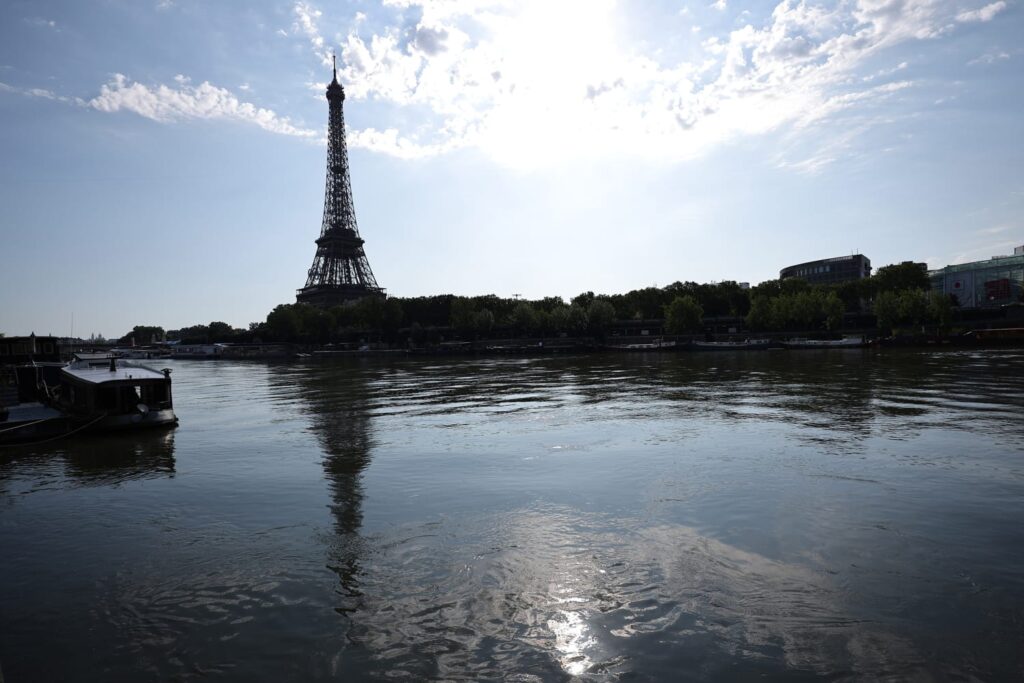Olympic organizers acknowledged that the Seine remains unsafe for swimming and postponed the men's triathlon race originally scheduled for Tuesday morning.
Organizers moved the men's event to Wednesday, after the women's triathlon, which had been scheduled for the same day.
“Water quality levels have improved over the past few hours but remain above acceptable levels at several points along the swim course,” World Triathlon, the international governing body for Olympic triathlon, said. X said in a statement.
In a statement, organisers said the race could be moved to Friday if necessary.
“Paris 2024 and World Triathlon reiterate that the well-being of athletes remains their number one priority,” the statement said, referring to event organisers.
Ahead of the Olympics, the city of Paris and local water authorities spent about $1.5 billion to clean up the Seine, upgrading an aging sewer system that often overflows into the river during heavy rains. As part of the upgrade, the city built huge underground cisterns to capture and treat stormwater.
There was hope to make the river clean enough to swim in, but efforts were not enough.
According to the latest monitoring report from tests carried out from July 17 to 23, E. coli levels spiked at Pont Alexandre III, where athletes are due to start and finish the individual triathlon, after heavy rains on July 20. At its peak, contamination was at least twice the level normally permitted by World Triathlon competition rules.
Routine monitoring in the months leading up to the Olympics similarly showed that levels of E. coli – an indicator of fecal matter – regularly spiked to dangerously high levels, especially after rainstorms caused water to wash off Paris' streets and into the river, increasing the likelihood of sewage being dumped into the river.
When fecal matter in swimming water reaches dangerous levels it can cause gastrointestinal illness – a common problem in urban waterways around the world.
Sunlight inactivates bacteria, so Paris organizers were hoping for sunny, clear weather: if the weather was favorable, the Seine's sewage treatment system would not have been damaged by high flows and the sun would have had time to do its job.
But rain soaked Paris during the opening ceremony on Friday, and the rain continued into Saturday.
Organisers cancelled the triathlon swimming training on Sunday and Monday, and then decided to postpone it for at least a day, citing the Seine's still-polluted condition.
Worrying weather conditions are looming and could lead to the cancellation of these and other events, with Meteo-France forecasting scattered thunderstorms in Paris from as early as Tuesday afternoon.
The remaining events are dependent on conditions, with the mixed relay triathlon scheduled for August 5th local time and the marathon swimming scheduled for August 8th and 9th local time.
Although most strains of E. coli are harmless, their presence is a sign that other potentially harmful bacteria are present.
“High bacterial counts mean there's too much waste in the water, and waste carries bacteria that make people sick,” Daniel Nizgorski, an ecologist who monitors water quality in the United States, told NBC News last month after reports that the Seine was still too polluted for athletes to compete.
Swimming in the Seine had been banned for nearly a century because of pollution, and many people remained skeptical that authorities could clean up the river in time for the Olympics.
Last year, Olympic organizers planned to hold test triathlons on the Seine to ensure the events would run smoothly, but several events were cancelled after the river failed pollution tests in August.
Then in April, the nonprofit Surfrider Foundation Europe released its own results from six months of testing, showing that nearly all samples exceeded acceptable contamination levels.
Routine monitoring by Hauts de Paris, the city's main water supplier, found that E. coli levels spiked after stormy weather throughout May, June and July.
Still, to demonstrate the river's cleanliness, Paris Mayor Anne Hidalgo, Tony Estanguet, president of the Paris 2024 Olympic organizing committee, and other officials took a ceremonial plunge into the Seine this month.
Their swim took place when water levels exceeded safety standards, according to the Associated Press.
NBC News is a division of NBCUniversal, which owns U.S. media rights to the Olympics through 2032, including the 2024 Paris Games.

